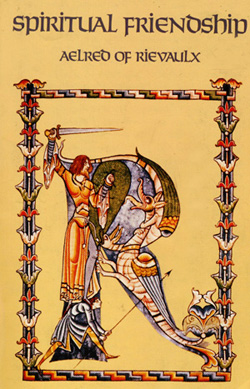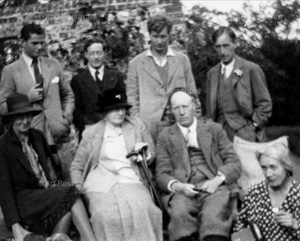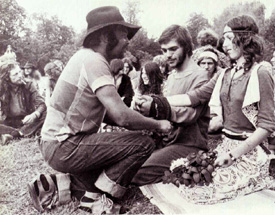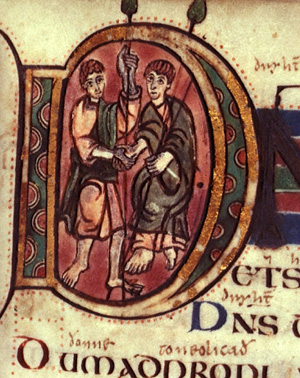 |
A Column of Catholic Orientation
The Nature of True Friendship
Marian T. Horvat, Ph.D.
Is it possible for a Catholic to have a true friendship with a non-Catholic? My friend Jan asked this question recently because her daughter was insisting that friendship meant one person caring about another, and had nothing to do with sharing the same religion. Jan disagreed.
I’m sure a modern dissertation on friendship would tend to agree with Jan’s daughter. But I don’t put much stock in modern theories, which justify all kinds of abominations, e.g. homosexuality, cohabitation, contraception, abortion, euthanasia, feminism, and so on. The list is endless, and we are always instructed that we must be indulgent and tolerant should a “friend” adopt such positions, that the real friend accepts the person “as he is.”

St. Aelred: the nature of true friendship |
Fueled by the ecumenical spirit of Vatican II, which counsels openness, dialogue and communion with persons of false religions and sects, more and more Catholics are adopting this position regarding friendship. Doctrine isn’t important. Only a charity based on feelings matters.
For my answer, let me turn to a traditional and much securer source. In 1150, Abbot Aelred of Rievaulx, a Cistercian monastery in Yorkshire, answered the same question posed by a monk called Yves: What is true friendship? His answer is the famous treatise Spiritual Friendship, (1) three chapters written in a dialogue form examines the relationship between friendship and the love of God.
The renowned Abbot’s sources are Scriptures, the writings of the Fathers – with St. Augustine a clear favorite – and great works of Antiquity such as Cicero’s De Amicitia [About Friendship]. Abbot Aelred’s credentials are the highest: in 1467 he was raised to the honor of the altars; his feast day is celebrated by the Cistercian Order on January 12.
Permit me to take the liberty of following the format of this beautiful treatise, formulating questions for you, my good friend Jan, with St. Aelred responding to you. There will be some adaptations: for example, in the 12th century when he lived, there were no Protestants, so I will apply his statements to our present day situation.
Is friendship with non-Catholics possible?
Jan: Is it possible for a Catholic to have true friendship with someone who is not Catholic?
St. Aelred: First, we must know what true friendship is. Let us take Cicero’s definition as a starting point: Friendship is agreement on matters human and divine with charity and good will (De Amicitia). This is only a starting point because we Catholics differ from the pagans in essential matters. The friendship that exists among us must begin in Christ, continue in Christ, and be perfected in Christ. True friendship cannot exist among those who live without Christ.(2)
You may argue that your Protestant friends accept Christ and, therefore, could be true friends. I believe not. Since harmony in thinking on “things divine” must exist among those who claim the illustrious name of friends, only persons who share the full Catholic Faith can be accounted as true friends. Indeed, only by accepting the same dogmas can they be of one mind and avoid daily controversies and quarrels regarding faith. Further, one will support the other in the practice of virtue – with the aim of continuing the earthly friendship in Heaven.
Can one be friends with an impenitent sinner?
Jan: My daughter says she has “friends” who are homosexual. Is this possible?

The English Bloomsbury group - an artistic circle of adultery and vice, not real friendship |
St. Aelred: True friends must have a shared love of virtue. As far as he can, one friend tries to cure the defects he observes in the other. For the love of God, he may endure such defects with the aim of correcting them. But he can never approve - tacitly or explicitly - the vices or sins of another.
If a homosexual does not want to change his sinful situation, this principle applies to him: For he that loves iniquity does not love but hates his own soul (Ps. 10:6). So, he does not love his own soul and for that reason will never be capable of a true friendship. Therefore, those who affectionately approve each other’s vices are not real friends, but accomplices in the practice of evil. Their relation is a distorted image of friendship that is not supported by truth. (3)
Regarding this relation that defiled persons profess for each other based on a likeness in evil, St. Alfred considered it unworthy of the name of friendship. (4)
Carnal and spiritual friendship
Jan: But it seems to me that something like friendship can exist even among those who are not seeking virtue. Isn’t this the case?

Hippy free love stems from carnal passions, not Catholic friendship |
St. Aelred: As a consequence of their human nature, all men feel the need for friendship. For this reason, some similarity in feeling can generate a relation that is not, however, a true and judicious friendship - which is spiritual. If we were to permit the name of friendship to this relation, we would have a kind of friendship we term carnal.
Carnal friendship springs from mutual harmony in vice. In a carnal friendship, a man wants another person to enjoy the pleasures of the body or senses. For example, a woman captivates a man, one is inflamed by the other, and they are kindled to form a sinful bond. Then, after they enter that “deplorable pact:” the one will do or suffer any crime or sacrilege for the sake of the other. And this is what they consider love and friendship.
They care nothing for uprightness or morals. The violence of their emotions and affections is what carries them away. How easily such passion can consume itself in its fury, or be dissolved with the same levity that fashioned it!
This is not true friendship, because when we indulge in sin we hate not only our own souls but also those we involve in sin. (5)
Worldly and spiritual friendship
Jan: Worldly friendships are very common today. Don’t they have something true about them?
St. Aelred: Worldly friendship is also different from true friendship. It is born of a desire for temporal advantages or possessions, and is always full of deceit and intrigue. It contains nothing certain, nothing constant, nothing secure, for it changes with fortune and follows the purse. Here is the fair weather friend who disappears in the day of your trouble. Take away the hope of profit, and he ceases to be a friend. Such friendship in fact offends charity because one person pretends a love for another when really what he wants is the other’s goods.
Still, at times this vicious friendship can lead to a certain degree of true friendship. Those who first enter into an accord in the hope of common profit can reach a certain degree of pleasing mutual agreement and affection, in so far as human affairs are concerned. But a friendship should in no way be called true when it is begun and preserved for the sake of some temporal advantage. (6)
Jan: There are some who think they ought to love their friends contrary to faith and honor. Others say one should lie for a friend, or even submit himself to what is dishonorable and vile for the sake of friendship. Are these positions rights? Are there limits to friendship?

The friendship of David and Jonathan was true |
St. Alfred: It has been said that there are no limits to love as long as it remains true by observing the law of God.
Therefore, one ought not listen to those who say that one should act in behalf of a friend in a way detrimental to faith and uprightness (Gen 3:6). No one can sin for the sake of a friend: this is never an excuse for sin. It is impossible to prefer a friend to morality. As soon as morality is damaged, friendship vanishes.
Further, if anything foul or shameful is demanded of a friend and an affection still remains, it is a dishonorable sentiment unworthy of the name of friendship. (7)
Finally, consider that Christ himself set up a definite limit for friendship when he said: Greater love than this no man hath, that a man lay down his life for his friends (Jn 15:15). Now, since the life of the soul is of far greater excellence than that of the body, no one should do anything to a friend that would bring about the death of the soul. (8)
That is, we cannot accept in a friend either sin or a false creed - since both separate the soul from God and the soul from eternal life.
Principles that do not change
St. Aelred’s principles on a true friendship – which he calls spiritual friendship because the true friend is concerned more about the soul than the body of the person he cares for – are timeless. They can be applied to all times and places. Therefore, the modern world should bend to them, which is what Church teaching did until the foul winds of Vatican II blew in, bringing with them adaptation to the modern world.
Before, Catholics were always taught that there was no salvation outside the Catholic Church. Therefore it behooved them to do everything possible to bring the ones they loved into the one fold of Christ.
The fountain and source of friendship is love of neighbor. And the solid foundation for this love is the love of God and the Catholic Church. Whatever is built on that foundation must conform to it and will last forever. This is, according to St. Alfred, the simple formula for true friendship.
The Saint has much more to say about friendship. He describes how a friend should first to be selected, next tested, finally admitted, and from then on treated as a friend deserves.
Perhaps another time we can discuss those four stages.
1. Aelred of Rievaulx, De Spirituali Amicitia, or Spiritual Friendship, trans. By Mary E. Laker, Spiritual Friendship (Kalamazoo, MI: Cistercian Publications, 1977).
2. Ibid., This answer is based on replies of Abbot Aelred on pp. 52-55
3. Ibid., pp. 58-59
4. Ibid., p. 84
5. Ibid., pp. 58-59
6. Ibid. pp. 60-61
7. Ibid., pp. 79-80
8.Ibid., p. 87

Posted on December 1, 2008

Related Topics of Interest
 Admiration and Affection in the Family Admiration and Affection in the Family
 Groups of Friends and Guilds Groups of Friends and Guilds
 The Steps of an Organic Relationship The Steps of an Organic Relationship
 Rewriting History to Serve the Gay Agenda Rewriting History to Serve the Gay Agenda
 The Progressivist Challenge to Fatima The Progressivist Challenge to Fatima
 Proper Behavior for Visits Proper Behavior for Visits

|
Related Works of Interest
|
Talks with Jan | Religious | Home | Books | CDs | Search | Contact Us | Donate

© 2002-
Tradition in Action, Inc. All Rights Reserved
|
 |
|